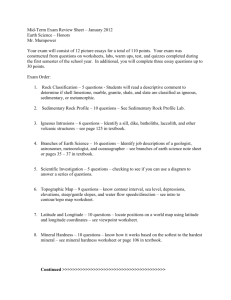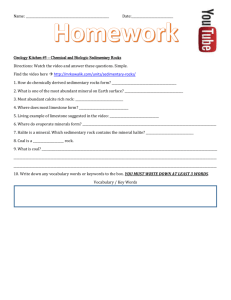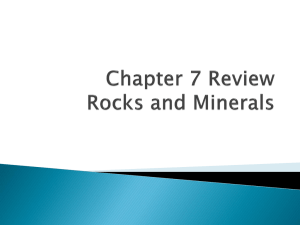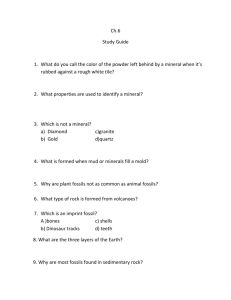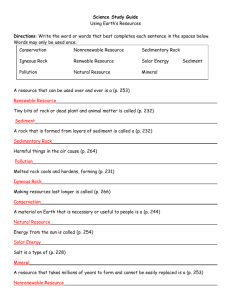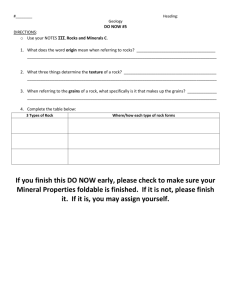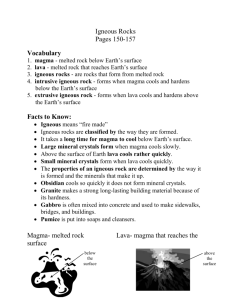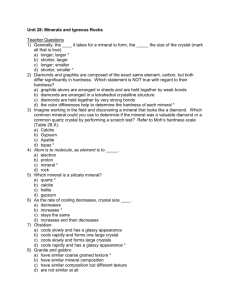Name Grade 6 Pretest Which sphere of the Earth system includes
advertisement
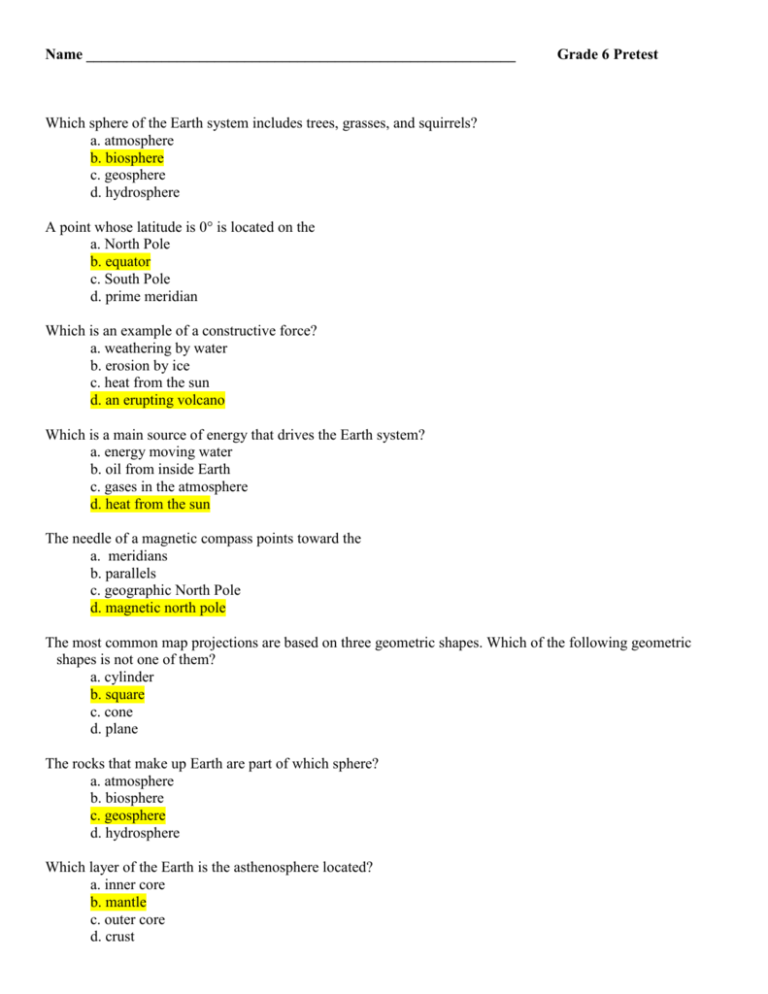
Name _________________________________________________________ Grade 6 Pretest Which sphere of the Earth system includes trees, grasses, and squirrels? a. atmosphere b. biosphere c. geosphere d. hydrosphere A point whose latitude is 0° is located on the a. North Pole b. equator c. South Pole d. prime meridian Which is an example of a constructive force? a. weathering by water b. erosion by ice c. heat from the sun d. an erupting volcano Which is a main source of energy that drives the Earth system? a. energy moving water b. oil from inside Earth c. gases in the atmosphere d. heat from the sun The needle of a magnetic compass points toward the a. meridians b. parallels c. geographic North Pole d. magnetic north pole The most common map projections are based on three geometric shapes. Which of the following geometric shapes is not one of them? a. cylinder b. square c. cone d. plane The rocks that make up Earth are part of which sphere? a. atmosphere b. biosphere c. geosphere d. hydrosphere Which layer of the Earth is the asthenosphere located? a. inner core b. mantle c. outer core d. crust The latitude of the North Pole is a. 100° north b. 90° north c. 180° north d. 90° south _________________ is the height of an object above sea level. a. Contour intervals b. Elevation c. Declination d. Index contour Which lists the main layers of Earth in order from outermost to innermost? a. lithosphere, asthenosphere, mesosphere b. core, mantle, crust c. crust, mantle, core d. mantle, core, crust How does heat move? a. from a warmer to a cooler object b. from a cooler to a warmer object c. toward a hot object d. away from a cold object What is the equator the starting line for measuring? a. elevation b. relief c. longitude d. latitude On Mohs’ hardness scale, which of the following mineral is the hardest? a. talc b. diamond c. topaz d. gypsum A mineral’s streak a. is more reliable than color in identifying the mineral b. reveals the mineral’s specific gravity c. is the same as the luster test d. reveals the mineral’s crystal structure Which of the following factors is not important in the formation of minerals? a. heat b. volcanic activity c. presence of ground water d. wind Which of the following terms is not used to describe a mineral’s luster? a. pearly b. waxy c. dull d. hexagonal A type of rock that forms deep within the Earth when magma solidifies is called a. sedimentary b. metamorphic c. organic d. igneous A type of rock that forms under high temperature and pressure but is not exposed to enough heat to melt the rock is a. sedimentary b. metamorphic c. organic d. igneous After they are deposited, sediments, such as sand, are turned into sedimentary rock when they are compacted and a. cemented b. metamorphosed c. melted d. weathered An igneous rock with a coarse- grained texture forms when a. magma cools very slowly b. magma cools very quickly c. magma cools quickly, then slowly d. magma cools slowly, then quickly The layering that occurs in sedimentary rock is called a. foliation b. ripple marks c. stratification d. compaction Types of Rocks: Read each description, then identify each one as sedimentary rock, igneous rock, or metamorphic rock. Coarse- grained or fine- grained Igneous Compressed and compacted Sedimentary Contact and regional Foliated and non-foliated Metamorphic Magma or lava cools down Igneous Properties of Minerals _D__Perform scratch test a. color b. luster c. cleavage and fracture d. hardness e. streak f. density g. crystal structure _A__Observe surface of mineral _E__Observe color of mineral’s powder _B__Observe how mineral reflects light _F__Find mass per unit volume _G_ Observe number an angle of crystal faces _C__Break mineral apart to see if it splits along flat surfaces Complete the following Table. Plate Boundary Convergent Divergent Sketch Definition Boundaries that come together Boundaries that move apart Label each fault as being normal, reverse, or strike- slip. Reverse Strike- Slip Normal Describe who Alfred Wegener was and his theory. Why wasn’t his theory excepted the first time he presented it?
